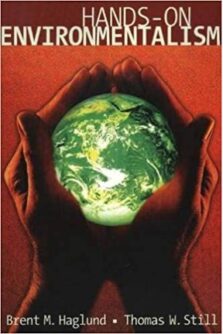
One of us, who shall remain nameless, was seated in a shuttle bus from one point to another next to Brent Haglund many years ago. There were beautiful, majestic, snow-capped mountains next to the American West highway on which we were driving. The anonymous suburbanite one of us remarked that it would be nice to live by mountains, but that maybe it would get a little boring after a while, given that the view doesn’t really change all that much.
Haglund is far too nice a human being to ever say anything negative about anybody, but he looked—well, he looked like that was the dumbest thing he’d ever heard. Consistent with his innate kindness, he patiently explained how that mountain, as all land, changed every day. It was fragile and required care, preferably from a knowledgeable manager who, well, loved and respected it. So too all the animals that relied on its existence in various ways, including wildlife and we humans, who may derive economic benefit from the environment of which it’s a part.
It was a teaching moment, and Haglund—as always, gently—taught. The one of us learned, as did the other from Haglund, too, at different times in different places. Then we had fun at the Sand County Foundation (SCF) reception to which were being shuttled.
Haglund retired in 2017, after having served nearly 30 years as chief executive officer of SCF, headquartered in Madison, Wis. Now led by Kevin McAleese, SCF effectuates the thinking and teaching of environmentalist Aldo Leopold—the University of Wisconsin professor who authored 1949’s A Sand County Almanac, a classic text of the environmental movement. Through the book and throughout his life, Leopold led development of what he termed the Land Ethic, which focuses on the opportunities and responsibilities for human management and enhancement of healthy, viable, and self-renewing ecosystems of land, plants, and animals.
Adhering to the Land Ethic and describing some of SCF’s programs, Haglund’s 2005 book Hands-On Environmentalism—co-authored with Tom Still—overviews a “civic environmentalism” based on local control, personal responsibility, government accountability, and economic opportunity.
Haglund was kind enough to speak with us last week. In the first part of our two-part conversation, which is here, we talk about Leopold, the Land Ethic, and some of SCF’s specific projects. The 12-and-a-half-minute video below is the second part of our discussion, in which we cover the Green New Deal, some successes of conservative environmentalism, and the perils of polarized philanthropic funding of environmental activity.
Schmidt and Hartmann (top row) and Haglund (bottom)
“I don't see much in what little I know about the Green New Deal that is directing human talent, money, and emphasis to communities and states,” Haglund tells us. “Instead, it's with a very broad brush. Many of the solutions can be sought in local and state” efforts to greater effect.
Addressing underappreciated environmental successes, Haglund says
[w]ildlife, in a general sense in the United States, is vastly better than it was at the time of all the Leopold work. Most people couldn’t have imagined. Wildlife, in many cases, is an environmental achievement. That's come out of private land-enhancement. Ownership has given rise to much of that success.
As well, “There are ways in which freely acting farmers and ranchers and foresters are using the principles of good land management,” he continues, and “working with their neighbors” to improve both soil and water quality.
“So is conservative environmentalism alive? Yes. Is it growing? Yes. Is it sound? Of course.”
On philanthropy, “[t]here's a risk of things that are associated with climate change,” Haglund later notes, “sucking all of the oxygen out of the room for environmental philanthropy. That could be directed to actual solutions, some of which are related to climate change.”